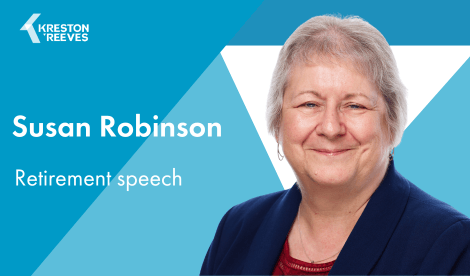Susan Robinson BA FCA FCIE DChA
- Accounts and Audit Partner, and Head of Charities and Not for Profit
- +44 (0)330 124 1399
- Email Susan
Suggested:Result oneResult 2Result 3
Sorry, there are no results for this search.
Sorry, there are no results for this search.
View all peoplePublished by Susan Robinson on 20 February 2017
Share this article
If your charity has an investment portfolio that is managed by a firm of brokers, the Common Reporting Standard (CRS) will affect you. The CRS applies to financial institutions and is an information exchange regime aimed at international tax transparency.
You may not have previously thought that your charity was a Financial Institution but it is if:
If your charity is deemed to be a Financial Institution, it will be required to gather data on its Account Holders and may have to submit a report to HM Revenue and Customs (HMRC).
The definition of an Account Holder will differ depending on the charity’s legal form:
Therefore, as can be seen, the CRS burden falls heaviest on unincorporated charities.
Just for clarification, if your charity receives less than 50% of its income from its investment portfolio, you will be able to self-certify the charity as an Active Non-Financial Entity to third parties such as banks. Such charities have no further responsibilities under the CRS provisions.
Charitable Financial Institutions must consider whether they need to register with HMRC. We have confirmed with HMRC that charities with no reportable Account Holders do not need to register with HMRC. In essence, this means that charities making grants only to UK beneficiaries do not need to register. However, charities that make any grants to Account Holders in other jurisdictions that have signed up for the CRS will need to register and report to HMRC.
In either case, charitable Financial Institutions must collect certain data on their Account Holders, wherever they are located (including the UK). The information to be collected should include the Account Holder’s:
This data needs to be retained for six years.
HMRC has agreed that if an Account Holder is a charity that is registered with the Charity Commission or OSCR you can assume they are resident in the UK and no further due diligence work is necessary. If your charity makes grants to individuals, it is recommended that they be asked to tick a box on the grant application form to indicate they are UK resident. If they are not UK resident, but are resident in a country that is a reportable jurisdiction, they must be included on the charity’s online return to HMRC. We suggest that all future grantees are asked to provide the information set out above so that your charity has full due diligence information for all grants made.
If there are any reportable transactions, an online return must be filed with HMRC by 31 May 2017. This return must list relevant data for Account Holders that are resident in particular jurisdictions. A full list of reportable jurisdictions is available on the HMRC website; alternatively please email here and we will send you the list. No reporting is required for UK resident Account Holders but, as mentioned above, it is necessary for due diligence information to be collected and retained.
For data protection purposes, charities are advised to notify all Account Holders that their data may be reported to HMRC and, from there, exchanged abroad.
In reality, the charities that are likely to be caught by these new rules are unincorporated grant making charities. Where grants are made to overseas beneficiaries, it is likely that an online report will be needed annually. Where grants are made only to UK beneficiaries, the charity will be deemed to be a Financial Institution but will not need to register with HMRC or make annual online reports. However, such charities will need to have a complete database of their beneficiaries clearly showing that they are UK resident.
The HMRC guidance is still evolving at the present time. If you believe you are affected by these rules please speak to your usual Kreston Reeves advisor or email here.
Share this article
This site is protected by reCAPTCHA and the Google Privacy Policy and Terms of Service apply.
Our complimentary newsletters and event invitations are designed to provide you with regular updates, insight and guidance.
You can unsubscribe from our email communications at any time by emailing [email protected] or by clicking the 'unsubscribe' link found on all our email newsletters and event invitations.
This site is protected by reCAPTCHA and the Google Privacy Policy and Terms of Service apply.




